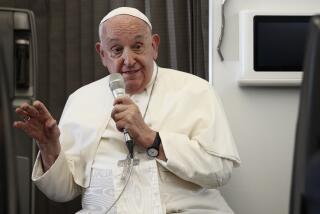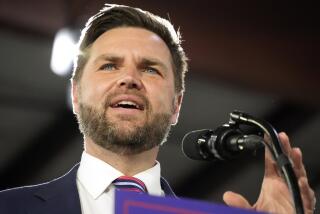For Obama but against abortion
Barack Obama has held himself out as a bridge builder across even divisive issues. No topic fits that description more than abortion.
In the final presidential debate Wednesday, Obama had seemingly finished giving his view on abortion when he added these words: Abortion is “always a tragic situation,” he said, and we should “try to prevent unintended pregnancies by providing appropriate education to our youth, communicating that sexuality is sacred ... and providing options for adoption and helping single mothers if they want to choose to keep the baby. ... Nobody is pro-abortion. ... We should try to reduce these circumstances.”
On those words the election may turn. Some Republicans are telling Catholics that supporting Obama is a sin. Catholics are instructed not to cast a ballot for an advocate of abortion, but these partisans overstate the church’s teaching to make an even broader claim: Namely, that a pro-choice candidate is off-limits too. Were this true, Obama’s substantial lead in the polls might be subject to religious preemption among the 25% to 30% of voters who are Catholic in such battleground states as Ohio, Pennsylvania, Missouri and Florida.
So can Catholics vote for a pro-choice candidate? The answer is yes, but as I found when I publicly endorsed Obama, you’ve then got “some ‘splain’n’ to do.” It’s a matter of conscience, but had Obama proclaimed himself to be pro-choice and said nothing more, it would have been problematic. But there are those additional words about appropriate education as well as adoption and assistance for mothers who choose to keep their baby.
This is not just debate posturing. It is consistent with Obama’s successful effort to add language to the Democratic platform affirming the choice of a mother to keep her child by pledging pre- and post-natal care, funded maternity leave and income support for poor women who, studies show, are four times more likely to pursue an abortion absent some tangible assistance.
Some might ask, isn’t John McCain, the self-proclaimed “pro-lifer,” still a morally superior choice for Catholics? Not necessarily. McCain’s commitment, as he stressed in the debate, is to try to reverse Roe vs. Wade. But Republicans have been after this for decades, and the effort has not saved a single child. Even if Roe were reversed -- unlikely, in my judgment -- it merely transfers the question to the states, most of which are not expected to ban abortion. A Catholic serious about preserving life could reasonably find Obama’s educational and material assistance to mothers the practical, stronger alternative.
Of course, this alternative is less than the absolute legal protection for unborn life sought by the Catholic faith, but it is more than the GOP delivers, or can deliver, with its speculations about judicial vacancies and reconsidered precedents. And it is reflective of an inescapable truth: While Americans worship God in differing ways, we are also a nation that seeks a common political ideal.
Pursuit of that goal, too, has shaped Obama’s campaign, which has sought to lessen the division between red and blue states in order to restore the nation. Compelled support for one religious view over another, or compelled support for the Supreme Court’s view, would inevitably leave us divided for years. The way out is to remember that when there are differences among religious creeds, none is entitled to be given preference in law or policy.
Sometimes the law must simply leave space for the exercise of individual judgment, because our religious or scientific differences of opinion are for the moment too profound to be bridged collectively. When these differences are great and persistent, as they unfortunately have been on abortion, the common political ideal may consist only of that space. This does not, of course, leave the right to life undecided or unprotected. Nor for that matter does the reservation of space for individual determination usurp for Caesar the things that are God’s, or vice versa. Rather, it allows this sensitive moral decision to depend on religious freedom and the voice of God as articulated in each individual’s voluntary embrace of one of many faiths.
Catholics know how to pick presidents. In the last nine presidential contests, Catholics have been with the popular vote-getter every time. Where are the Catholics lining up in 2008? A recent Zogby poll has the national Catholic vote as a dead heat within the margin of error. If Catholic past is prologue, this election will be far closer than general polling suggests, and Obama’s few additional words in the final debate may prove to be his political salvation.
Douglas W. Kmiec is a law professor and the author of “Can a Catholic Support Him? Asking the Big Question About Barack Obama.”
More to Read
A cure for the common opinion
Get thought-provoking perspectives with our weekly newsletter.
You may occasionally receive promotional content from the Los Angeles Times.










